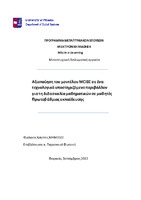Αξιοποίηση του μοντέλου MCIEC σε ένα τεχνολογικά υποστηριζόμενο περιβάλλον για τη διδασκαλία μαθηματικών σε μαθητές πρωτοβάθμιας εκπαίδευσης

View/
Keywords
Εξισώσεις ; Μοντέλο MCIEC ; Πλατφόρμα Moodle ; Εικονικά δωμάτια διαφυγής ; Ηλεκτρονική μάθηση ; Escape roomsAbstract
In the modern digital age and especially after the effects of the COVID-19 pandemic, it is necessary for teachers to keep up and apply new methods and ways of teaching during the educational process with the help of new technologies. Specifically in the subject of mathematics, the difficulties that have been recognized in learning mathematics for a century, the poor performance of a large percentage of students and the Greek reality, with old curricula that are not aligned with the needs of students, create a framework for necessary changes.
For this purpose, an e-course for the mathematics entitled "Escapes from the Museum of Mathematics" was designed, implemented and evaluated. This utilizes digital escape rooms (Virtual escape rooms), is implemented entirely electronically through the Moodle platform and is orchestrated according to the MCIEC (motivation, context, interactivity, evaluation and connectivity) model. The purpose of the e-course is the improvement of mathematical abilities, the development of motivation and 21st century skills, such as communication and cooperation and the active participation of students. In particular, the e-course concerns equations at the 6th grade level and contains a variety of online activities with the help of web 2.0 tools that students must complete to complete the e-course.
To achieve the higher goal, the program was implemented and evaluated by 30 teachers. The research conducted by deriving data from questionnaires, rubrics, embedded quizzes and worksheets provided information to explore and answer the research questions. From the statistical analysis of the data collected after the end of the experimental process, it appeared that there is a verification of all the alternative hypotheses defined according to the research questions. Therefore, this educational intervention is considered successful, fulfilling the goals that were set. Extensions and suggestions for further research are mentioned in the last chapter of this paper.


